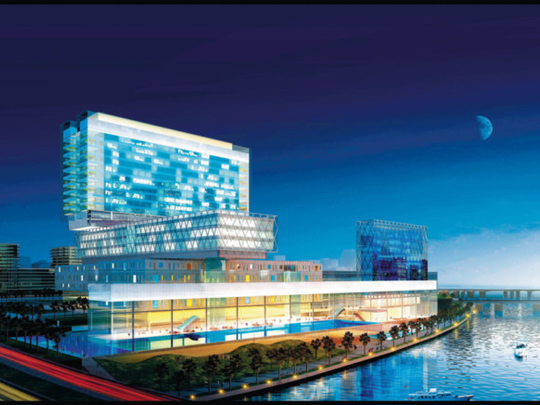
The Joint Commission International (JCI), Food and Drugs Administration (FDA) and College of American Pathologists (CAP) certifications are sought after by hospitals, pharmacies and health-care professionals across the world. The UAE is no exception to this.
In the UAE, hospitals that have been accredited by the JCI, a US-based non-profit tax-exempt body, were the first to be allowed to bring in patients on medical visas. An FDA certification is one of the key requirements for the approval of pharmaceutical products in the UAE. Medical laboratories, on the other hand, seek to be certified by the CAP.
Quality health care
Marwan Abedin, CEO, Dubai Healthcare City (DHCC), says, “The US has long been regarded as a pioneer in setting these type of benchmark standards with a focus on creating internationally recognised hospitals, clinics and medical professionals — a mission that resonates with the DHCC and a model we have regarded when establishing an internationally recognised centre of health-care excellence.
“The internationally acclaimed certification standards that have been welcomed within DHCC are selected based on an emphasis on structured medical training with robust exit examination, evidence-based medicine and continuous improvement — core principles within the DHCC,” he adds.
For the US, which reportedly spends about 18 per cent of its GDP on health care, nearly twice as much as most of the other developed countries, health-care exports are more than just medicines. Doctors, certifications, hospital adminis-trators and medical practices all make it to other countries. It helps that the system is constantly monitored by industry watchdogs and research bodies. In fact, a report, Progress Toward Value-Based Health Care, released in June by the Boston Consulting Group, concludes that due to the complex and fragmented nature of the US health-care system, developing a value-based health-care model nationwide remains daunting.
However, not only do the standards work but they are also universally sought after. One of the most illustrious examples of this is the health-care system in Abu Dhabi, widely considered the best in the region.
The Cleveland Clinic Abu Dhabi, a multi-speciality hospital currently under construction on Al Maryah Island, as a wholly owned subsidiary of Mubadala Development Company, is reportedly the most complex hospital being built in the world. The Dh6.6-billion facility, built over an area of 92,000 square metres, will have 360 beds including 32 for VIPs and 72 for ICU patients and 13 floors of critical and acute inpatient units.
Best medical services
The Cleveland Clinic is already associated with the Shaikh Khalifa Medical City (SKMC), owned by SEHA, the Abu Dhabi Health Services Company.
SKMC was recently recognised as one of the world’s top cardiovascular disease institutions and is the first hospital outside the US to receive accreditation as a Cycle IV Chest Pain Institute.
Development on the new SKMC, which is expected to be a game changer, counts on American expertise. With an investment cost of Dh2.2 billion, the 300,000 square metre integrated medical city will comprise three hospitals — a general hospital, a Level 1 trauma centre and a tertiary women’s and paediatric hospital.
More than 16 years ago, one of the first modern private hospitals in Dubai also set US standards as a yardstick. “The inspiration behind the creation of the American Hospital Dubai was the health-care model and quality standards found in the US, which are recognised as world leading. All American Hospital Dubai physicians are North American Board-certified or hold equivalent Western medical board certification,” says Thomas Murray, Chief Executive Officer, American Hospital Dubai.
In May 2000, the American Hospital Dubai became the first hospital in the Middle East to be awarded accreditation by the Joint Commission International. In 2001, its medical laboratory became the first private laboratory in the Middle East to be accredited by the CAP.
“Arguably, the most important benchmark is the credentials of the physicians at American Hospital Dubai; all physicians have to be American board certified or a Western board equivalent, have at least three and a half years of post-board training in the country awarding the board certification; all our physicians must maintain their credentials for as long as they are practising at the American Hospital Dubai,” adds Murray.
US health-care standards are helpful for a country set on creating high standards. For Emiratis, travelling to the US for the best medical care — whether for cancer treatments — women’s health or paediatrics, has been a matter of course.
Now that the country is focusing on being a medical tourism hub in the region to serve patients of multiple nationalities, US benchmarks prove to be a reference point recognised by all.
“For example, the US Board Certification for Physicians, as governed by the American Board of Medical Specialities and the National Board of Medical Examiners, are approved licensure credentialing standards within DHCC. Two of the DHCC’s largest facilities are accredited by the US-founded JCI hospital accreditation standards,” says Murray.
Murray says the JCI is a consistent advocate for patient safety and quality improvement and promotes rigorous standards of care to achieve the best possible patient environment in line with the DHCC’s mission. “Our leading laboratories have received accreditation through the CAP. This leading organisation of board-certified pathologists serves patients, pathologists and the public by fostering and advocating excellence in the practice of pathology and laboratory medicine worldwide,” he explains.
“Again, its stringent approach to patient safety is in line with DHCC’s commitment to establishing a health-care community built on excellence. Certification by the FDA for new technologies and practice standards is also recognised within DHCC.” ■








